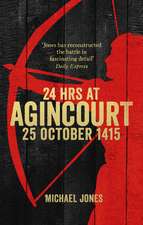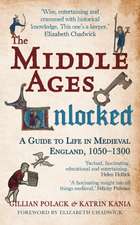Church, State and Community: Historical and Comparative Perspectives: Variorum Collected Studies
Autor Antony Blacken Limba Engleză Hardback – 27 mai 2003
Din seria Variorum Collected Studies
-
 Preț: 313.38 lei
Preț: 313.38 lei -
 Preț: 311.41 lei
Preț: 311.41 lei -
 Preț: 299.55 lei
Preț: 299.55 lei -
 Preț: 325.68 lei
Preț: 325.68 lei -
 Preț: 406.12 lei
Preț: 406.12 lei -
 Preț: 311.18 lei
Preț: 311.18 lei -
 Preț: 325.31 lei
Preț: 325.31 lei -
 Preț: 396.01 lei
Preț: 396.01 lei - 9%
 Preț: 1039.89 lei
Preț: 1039.89 lei -
 Preț: 266.20 lei
Preț: 266.20 lei -
 Preț: 343.34 lei
Preț: 343.34 lei - 9%
 Preț: 938.10 lei
Preț: 938.10 lei -
 Preț: 351.48 lei
Preț: 351.48 lei - 9%
 Preț: 938.86 lei
Preț: 938.86 lei -
 Preț: 335.37 lei
Preț: 335.37 lei - 9%
 Preț: 937.14 lei
Preț: 937.14 lei -
 Preț: 351.42 lei
Preț: 351.42 lei -
 Preț: 320.00 lei
Preț: 320.00 lei - 38%
 Preț: 766.84 lei
Preț: 766.84 lei - 23%
 Preț: 315.48 lei
Preț: 315.48 lei - 36%
 Preț: 740.06 lei
Preț: 740.06 lei - 34%
 Preț: 764.20 lei
Preț: 764.20 lei - 39%
 Preț: 684.75 lei
Preț: 684.75 lei - 29%
 Preț: 247.40 lei
Preț: 247.40 lei - 37%
 Preț: 488.89 lei
Preț: 488.89 lei - 38%
 Preț: 766.91 lei
Preț: 766.91 lei - 34%
 Preț: 769.51 lei
Preț: 769.51 lei - 38%
 Preț: 769.85 lei
Preț: 769.85 lei - 36%
 Preț: 823.43 lei
Preț: 823.43 lei - 25%
 Preț: 225.28 lei
Preț: 225.28 lei - 25%
 Preț: 225.54 lei
Preț: 225.54 lei - 34%
 Preț: 767.07 lei
Preț: 767.07 lei - 34%
 Preț: 764.20 lei
Preț: 764.20 lei - 34%
 Preț: 736.38 lei
Preț: 736.38 lei - 34%
 Preț: 738.43 lei
Preț: 738.43 lei - 25%
 Preț: 226.52 lei
Preț: 226.52 lei - 33%
 Preț: 491.66 lei
Preț: 491.66 lei - 34%
 Preț: 485.78 lei
Preț: 485.78 lei - 34%
 Preț: 485.78 lei
Preț: 485.78 lei - 38%
 Preț: 766.34 lei
Preț: 766.34 lei - 36%
 Preț: 739.17 lei
Preț: 739.17 lei - 31%
 Preț: 473.94 lei
Preț: 473.94 lei - 18%
 Preț: 843.63 lei
Preț: 843.63 lei - 38%
 Preț: 774.91 lei
Preț: 774.91 lei - 38%
 Preț: 769.92 lei
Preț: 769.92 lei - 34%
 Preț: 764.20 lei
Preț: 764.20 lei - 50%
 Preț: 488.81 lei
Preț: 488.81 lei - 36%
 Preț: 488.49 lei
Preț: 488.49 lei - 34%
 Preț: 769.10 lei
Preț: 769.10 lei - 38%
 Preț: 766.99 lei
Preț: 766.99 lei
Preț: 771.17 lei
Preț vechi: 1158.69 lei
-33% Nou
Puncte Express: 1157
Preț estimativ în valută:
147.58€ • 153.51$ • 121.84£
147.58€ • 153.51$ • 121.84£
Carte tipărită la comandă
Livrare economică 14-28 aprilie
Preluare comenzi: 021 569.72.76
Specificații
ISBN-13: 9780860789048
ISBN-10: 0860789047
Pagini: 368
Dimensiuni: 150 x 224 x 25 mm
Greutate: 0.84 kg
Ediția:1
Editura: Taylor & Francis
Colecția Routledge
Seria Variorum Collected Studies
Locul publicării:Oxford, United Kingdom
ISBN-10: 0860789047
Pagini: 368
Dimensiuni: 150 x 224 x 25 mm
Greutate: 0.84 kg
Ediția:1
Editura: Taylor & Francis
Colecția Routledge
Seria Variorum Collected Studies
Locul publicării:Oxford, United Kingdom
Public țintă
Academic and PostgraduateCuprins
Contents: Preface; Conciliar Ideas: The political ideas of conciliarism and papalism, 1430-1450; What was conciliarism? Conciliar theory in historical perspective; The universities and the Council of Basle: ecclesiology and tactics; The universities and the Council of Basle: collegium and concilium; Diplomacy, doctrine and the disintegration of an idea into politics; Heimericus de Campo: the council and history; The realist ecclesiology of Heimerich van de Velde; Panormitanus on the Decretum; The Council of Basle and the second Vatican Council; Communal Ideas: Society and the individual from the Middle Ages to Rousseau: philosophy, jurisprudence and constitutional theory; Political languages in later medieval Europe; The juristic origins of social contract theory; The commune in political theory in the late Middle Ages; Communal democracy and its history; Harmony and strife in political thought c.1300-1500; Christianity and republicanism from St. Cyprian to Rousseau; Christianity and republicanism: a response to Nederman; Republicanism as a European phenomenon; Concepts of civil society in pre-modern Europe; Nation and community in the international order; The Comparative Study of Ideas: Individuals, groups and states: a comparative overview; Classical Islam and medieval Europe: a comparison of political philosophies and cultures; Islamic views of international order; Harmony versus conflict: biological and strategic paths to toleration; Decolonization of concepts; The history of political thought: a western patient; Index.
Descriere
Running through the papers collected here is the concern to try and understand the reasons which people thought they had for acting in a certain way, and - not always the same thing - the reasons which they expressed for what they were doing. The book's first section focuses on the theories of government in the late medieval Church, especially the ideas of conciliarism; the second is concerned with the study of medieval guild and city organisation and politics, looking at the communal movement and at the impact of Christianity on the development of republican ideas. In the papers in the final part, Professor Black takes a comparative approach, setting the political thought and traditions of the Islamic world, in particular, alongside those of Western Europe as part of an attempt to understand the origins of the modern state: to know why this emerged in Europe, he argues, it is necessary to ask why it did not develop elsewhere and it is intellectual and cultural factors which provide the most obvious differentiating features.











